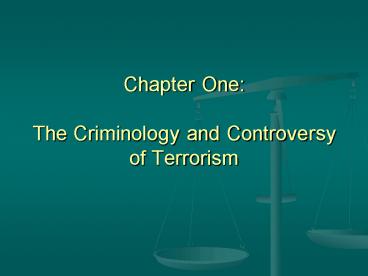Chapter One: The Criminology and Controversy of Terrorism - PowerPoint PPT Presentation
1 / 27
Title:
Chapter One: The Criminology and Controversy of Terrorism
Description:
Howard terrorism is an emergency situation best handled by intelligence and law ... Stern's View on Group Cohesion: 'Us against them' mentality against common enemy ... – PowerPoint PPT presentation
Number of Views:355
Avg rating:3.0/5.0
Title: Chapter One: The Criminology and Controversy of Terrorism
1
Chapter OneThe Criminology and
Controversy of Terrorism
2
Why Definitions are Important
3
Why Definitions are Important
- Why do people argue about the meaning of
terrorism? - Meaning changes
- It is a concept
- Means different things at different times
4
Why Definitions are Important
- Pejorative Connotation of Terrorism
- Political and social degradation when labeled a
terrorist - Routine crimes assume greater importance when
described as terrorism - Political movement can be hampered when followers
believed to be terrorists
5
Why Definitions are Important
- Definitions of Terrorism from Various Interest
Groups - Law Enforcement
- Governments
- Advocating for redistribution of wealth
- Pro-life/Pro-choice
6
Definitions of Terrorism
7
Definitions of Terrorism
- Jenkins Threat or use of force for political
change - Laqueur Use of force to achieve political
objective targets innocent people - Crenshaw Cannot be defined without analysis of
act, target, and possibility of success
8
Definitions of Terrorism
- Herman Defined in terms of state repression
- Schmid Meaning is derived from targets and
victims of terrorists - Barnett Terrorists do not have vested interest
in maintaining political/economic structures
because they do not benefit from them
9
The Meaning of the War on Terrorism
10
The Meaning of the War on Terrorism
- Arguments accepting the war with terrorism
- Friedman
- Blank
- Cohen
- Hill
11
The Meaning of the War on Terrorism
- Argument that does not accept the war on
terrorism - Howardterrorism is an emergency situation best
handled by intelligence and law enforcement
services
12
The Tactics of Terrorism
13
The Tactics of Terrorism
- Jenkins six tactics of terrorism
- Bombing (most common)
- Hijacking
- Arson
- Assault
- Kidnapping
- Hostage Taking
- Weapons of mass destruction?
14
Tactics of Terrorism
- Four Force Multipliers
- Technology
- Transnational support networks
- Media coverage
- Religious fanaticism
15
How Terrorists Groups Justify Behavior
16
How Terrorist Groups Justify Behavior
- Justification for violence
- Consumed with the cause
- Reasons potential terrorists join groups
- Sympathy for the cause
- Social misfits
17
How Terrorist Groups Justify Behavior
- Posts Motivational Theories
- No single terrorist personality
- Social outcasts who fall in with like-minded
individuals - Us against them mentality
- Antisocial behavior rewarded and reinforced
within this group - Rejection of external authority acceptance of
internal authority
18
How Terrorists Groups Justify Behavior
- Sterns View on Group Cohesion
- Us against them mentality against common enemy
- Group must have a story/mythology to inspire and
guide members - Group needs own language or symbolic words to
demonize enemy
19
How Terrorist Groups Justify Behavior
- Berlet and Lyons
- Groups look for conspiracies and then scapegoat a
group for the conspiracy - Demonize scapegoats as primary cause of injustice
- Leaders inspire members to action and search to
demonize more enemies
20
Warrior Dreams
21
Warrior Dreams
- Warrior Culture
- Warriors social outcasts whose lives center on
violence lone wolf - Identity crisis of extreme conservatives
following Vietnam War - Culture values guns and violent confrontations
- Paramilitary culture/lifestyle war games,
paramilitary religion, war films/books,
extremists
22
Warrior Dreams
- Targets of the warrior
- Enemy lacks all standards of human decency whose
goal is to destroy American society and culture - Communist
- Dope dealer
- Mafioso
- Academic
- Liberal
23
Warrior Dreams
- Lone warrior
- SWAT, commando units reflect organized military
values, so warrior rejects them - At war with status quo
- Justifies actions of militias, New Order,
neo-Nazis - Provides formula for justifying terrorism
24
Terrorist Profiles Three Views
25
Terrorist Profiles Three Views
- Hacker one of first criminal profilers
- Hackers three types of terrorists
- Criminals
- Join terrorist groups for payoff or vengeance
- Crazies
- Join terrorist groups for thrills of lifestyle
- Crusaders
- People who believe deeply in a cause
26
Terrorist Profiles Three Views
- Laqueurs Views of Terrorist Profiling
- No terrorist profile possible due to different
types of terrorism - Terrorism fluctuates over time
- Some group characteristics can be determined
through type of terrorist movement - Impossible to profile terrorist personality
because terrorism is a political activity rather
than a subject of criminology
27
Terrorist Profiles Three Views
- Ross alternative view Social/psychological
processes rather than profiles - Joining the group
- Forming the activity
- Remaining in the campaign
- Leading the organization
- Engaging in acts of terrorism































